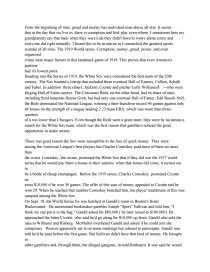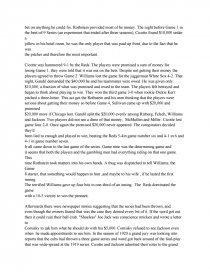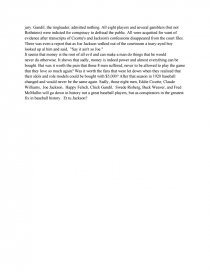1919 World Series
Essay by review • October 9, 2010 • Essay • 1,205 Words (5 Pages) • 2,445 Views
From the beginning of time, greed and money has motivated man above all else. It seems
that in the day that we live in, there is corruption and foul-play everywhere. I sometimes here my
grandparents say that back when they were kids they didn't have to worry about crime and
everyone did right naturally. I found this to be as untrue as I researched the greatest sports
scandal of all time, The 1919 World series. Corruption, money, greed, power, and even organized
crime were major factors in this landmark game of 1919. This proves that even America's pastime
had it's lowest point.
Heading into the Series of 1919, the White Sox were considered the best team of the 20th
century. The Sox boasted a lineup that included three eventual Hall of Famers; Collins, Schalk
and Faber. In addition three others, Jackson, Cicotte and pitcher Lefty WilliamsÐ'--who were
forging Hall of Fame careers. The Cincinnati Reds, on the other hand, had its share of stars,
including third baseman Heinie Groh, but had only one eventual Hall of Famer, Edd Roush. Still,
the Reds dominated the National League, winning a then-franchise-record 96 games against only
44 losses on the strength of a league-leading 2.23 team ERA, which was more than three-quarters
of a run lower than Chicago's. Even though the Reds were a great team, they were by no means a
match for the White Sox team, which was the first reason that gamblers noticed the great
opportunity to make money.
There was good reason the Sox were susceptible to the lure of quick money. They were
among the American League's best players but Charles Comiskey paid most of them no more than
the worst. Comiskey, the owner, promised the White Sox that if they did win the 1917 world
series that he would pay them a bonus in their salaries. when that bonus did come, it turned out to
be a bottle of cheap champagne. Before the 1919 series, Charles Comiskey promised Cicotte an
extra $10,000 if he won 30 games. The offer of this sum of money appealed to Cicotte and he
won 29. When he reached that number Comiskey benched him, the player resentment of this was
rampant among the White Sox.
On Sept. 18, the World Series fix was hatched in Gandil's room in Boston's Hotel
Buckminster. He summoned bookmaker-gambler Joseph "Sport" Sullivan and told him, "I
think we can put it in the bag." Gandil asked for $80,000 ( he later raised to $100,000). He
approached the bitter Cicotte, who said he'd go along for $10,000 up front. Gandil also sold the
idea to Williams and Risberg. McMullin overheard Gandil and asked if he could join the
conspiracy . Weaver apparently sat in on some meetings but refused to participate. Gandil was
told he'd be paid before the first game. But Sullivan didn't have that kind of money. He brought in
other gamblers and, through them, the alleged gangster, Arnold Rothstein. It was said he would
bet on anything he could fix. Rothstein provided most of he money. The night before Game 1 in
the best-of-9 Series (an experiment that ended after three seasons), Cicotte found $10,000 under a
pillow in his hotel room, he was the only player that was paid up front, due to the fact that he was
the pitcher and therefore the most important.
Cicotte was hammered 9-1 by the Reds. The players were promised a sum of money for
losing Game 1, they were told that it was out on the bets. Despite not getting their money the
players agreed to throw Game 2. Williams lost the game for the juggernaut White Sox 4-2. That
night, Gandil demanded the $40,000 he and his teammates were owed. He was given only
$10,000, a fraction of what was promised and owed to the team. The players felt betrayed and
began to think about playing to win. They won the third game 3-0 when rookie Dickie Kerr
pitched a three-hitter. This act got the Rothstein and his men thinking that the players were
serious about getting their money so before Game 4, Sullivan came up with $20,000 and promised
$20,000 more if Chicago lost. Gandil split the $20,000 evenly among Risberg, Felsch, Williams
and
...
...


